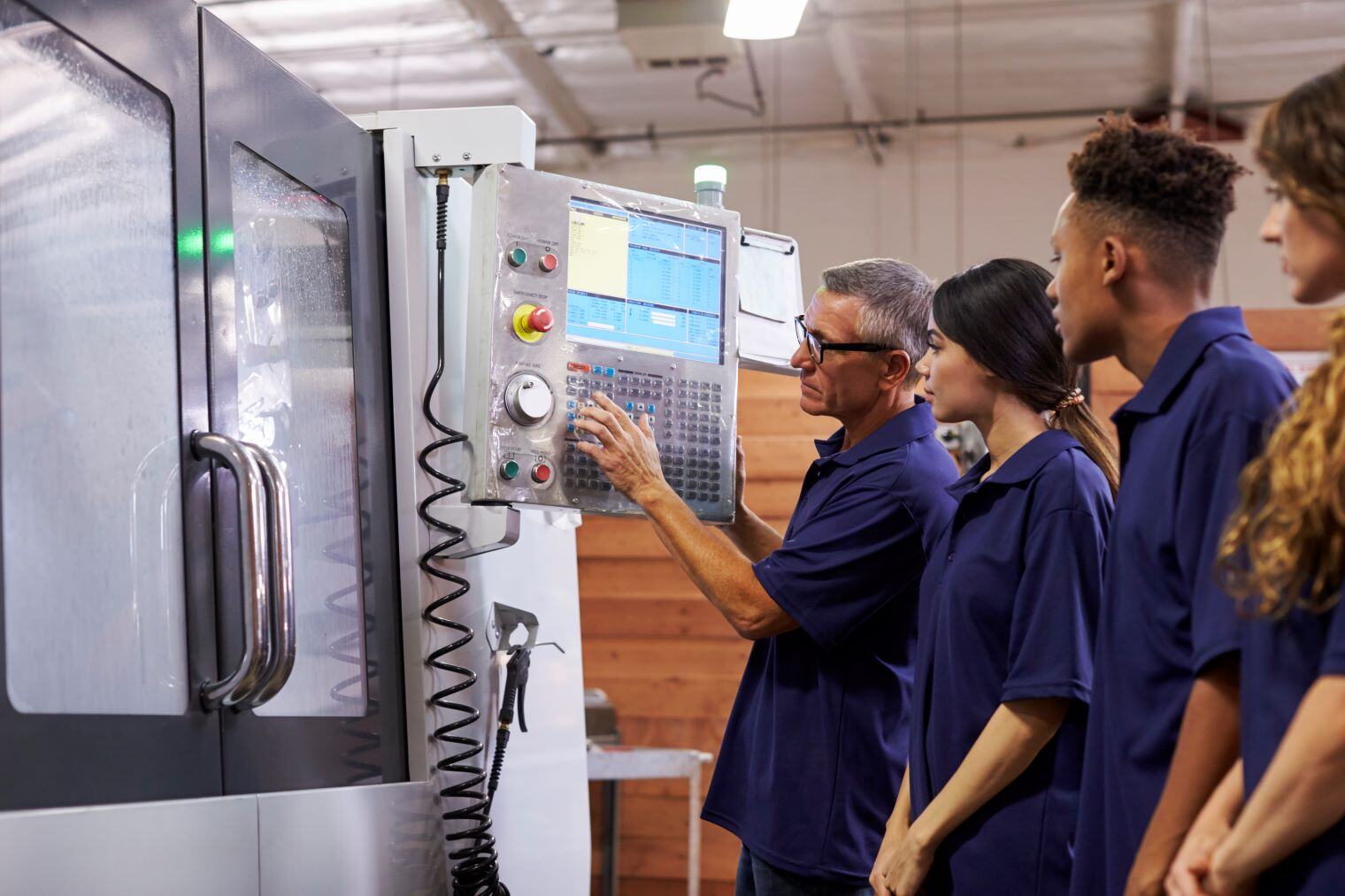Machine Operator Jobs in Modern Manufacturing: High-Demand Roles & Declining Careers

Post Categories
Michaela Rose
If you’re a job seeker eyeing a career as a machine operator in manufacturing, you’re stepping into an industry that’s shifting gears fast. Here’s the truth: not all machine operator jobs are equal. Some are exploding with opportunity, while others are sputtering out. Want to know which roles are hot, which are cooling, and how to land the best ones? We’ve got the inside track from working with employers daily. Let’s break it down so you can make your next move with confidence.
What’s a Machine Operator, Anyway?
New to this? No sweat—let’s start simple. A machine operator is the person who runs the equipment that makes stuff in a factory. Could be cutting metal parts, packing products, or even guiding a robot arm. You’re the hands and eyes keeping production rolling—loading materials, hitting start, and making sure everything comes out right. It’s physical, it’s technical, and in 2025, it’s a bigger deal than ever. At Timpl, we see operators as the heartbeat of manufacturing—without you, nothing gets made.
Automation’s taking over repetitive tasks, companies are bringing jobs back to the U.S., and precision is king. This isn’t your grandpa’s factory anymore. Knowing the trends can be the difference between a thriving career and a dead-end job.
Here’s what’s shaping the shop floor in 2025 and beyond.
Machine Operator Roles in High Demand
These positions are growing, fueled by technological advancements, consumer demand, and workforce shortages. If you’re looking to enter the field or advance your career, these are the roles with the strongest job outlook.
These positions are growing, fueled by technological advancements, consumer demand, and workforce shortages. If you’re looking to enter the field or advance your career, these are the roles with the strongest job outlook.
1. CNC Machine Operators – Precision Manufacturing at Its Best
CNC (Computer Numerical Control) machine operators program and run high-precision machines that cut, drill, and shape metal, plastic, and other materials. These machines are critical in aerospace, automotive, and medical device manufacturing, where precision is key.
Industry Outlook:
-
Around 88,900 CNC job openings per year, driven by retirements and industry demand.
-
While the Bureau of Labor Statistics (BLS) projects a 7% decline in overall metal and plastic machine jobs by 2033, CNC operators remain an exception because of their specialized skills and the demand for precision work.
Pay Range: $23–$30 per hour, with higher wages in specialized sectors.
How to Get Started: Employers prioritize candidates with CNC training from technical schools or apprenticeship programs. Some community colleges also offer affordable certification programs that can fast-track entry into this field.
Manufacturers rely on packaging and filling machine operators to prepare finished goods for shipping, distribution, and retail. These roles are especially critical in industries such as food production, pharmaceuticals, and e-commerce fulfillment centers.
Industry Outlook:
-
The continued rise of e-commerce and consumer goods production ensures steady demand for these roles.
-
The occupation is projected to grow by 7% from 2023 to 2033, faster than average, with approximately 4,390 job openings annually due to retirements and industry demand. (US Bureau Labor of Satistics)
Pay Range: $16.56–$22 per hour, often with overtime opportunities.
How to Get Started: Many employers offer on-the-job training, making this a great entry point into manufacturing for those without prior experience.
Industrial machinery mechanics combine machine operation with equipment maintenance, ensuring that production lines run smoothly. Companies are increasingly looking for operators who can also perform troubleshooting and preventive maintenance.
Industry Outlook:
-
The BLS projects 6% job growth through 2033, with 48,900 annual openings.
-
As manufacturing processes rely on more advanced equipment, mechanics with operational skills are highly valuable.
Pay Range: $30+ per hour, with opportunities for higher earnings in specialized industries.
How to Get Started: Many machine operators transition into maintenance roles by gaining experience and earning certifications in industrial maintenance, mechatronics, or automation.
As factories integrate more robotic systems for welding, assembly, and material handling, the need for operators who can oversee, program, and troubleshoot automation is growing.
Industry Outlook:
-
The BLS does not track robotics operators separately, but related fields like industrial technology are projected to grow 14% through 2033.
-
Industries such as automotive and electronics manufacturing are leading the adoption of robotics, creating demand for skilled operators.
Pay Range: $25–$40 per hour, depending on experience and industry.
How to Get Started: Many companies provide on-the-job training. Starting in forklift operation or general machine operation can be a stepping stone toward robotics roles.
Machine Operator Roles in Decline
These jobs aren’t disappearing overnight, but automation and industry changes are making them less competitive. If you’re currently in one of these roles, consider upskilling to a growing sector.
1. Traditional Lathe and Grinding Machine Operators – Replaced by CNC
Manual lathe and grinding machine operators once played a key role in metalworking, but CNC machining has largely taken over these tasks.
Industry Outlook:
- These jobs fall under the 7% decline projected for metal and plastic machine workers through 2033. (US Bureau Labor Satistics)
- While openings still exist, most are due to retirements rather than industry growth.
How to Stay Competitive: Transitioning to CNC operation or robotics is a natural next step for workers in this field.
2. Manual Press Operators
Press machine operators, who stamp, punch, and shape materials, are seeing fewer job opportunities due to automation and outsourcing.
Job growth: Some demand remains in automotive and appliance manufacturing, but overall, the role is becoming less common.
How to Stay Competitive: Training in robotics or industrial maintenance can help shift into a more stable role.
Frequently Asked Questions (FAQs)
What is a machine operator job description?
A machine operator job description includes setting up, monitoring, and maintaining machinery used in manufacturing. Responsibilities may vary based on industry but often involve adjusting machine settings, troubleshooting malfunctions, and ensuring quality control.
How can I find machine operator jobs near me?
These tips may not be tailored to Machinist or a specific job, but they still offer valuable guidance on landing the job you’re looking for.
- How to find a job in Cartersville, GA
- How to find a job in Manteca, CA
- How to find a job in LaGrange, GA
Next, let’s explore what interview questions are recommended, How to follow a job after interview, How to negotiate after a job offer to help you succeed, what is a good weakness today in a job interview, How to answer "tell me about yourself"
What skills are needed to become a machine operator?
Successful machine operators need technical skills, mechanical aptitude, attention to detail, and problem-solving abilities. In modern manufacturing, experience with CNC, robotics, or maintenance is a major advantage.
What are the qualifications for a machine operator?
Most machine operator roles require a high school diploma or GED, with many offering on-the-job training. However, certifications in CNC, industrial automation, or maintenance can significantly boost hiring prospects.
How can a machine operator move into industrial maintenance?
Many machine operators transition into industrial maintenance by learning troubleshooting and repair skills on the job. Taking courses in PLC programming, hydraulics, or electrical systems can help advance into higher-paying maintenance roles.
Machine Operator resume: What should I highlight?
A strong resume can set you apart from other job seekers. Here’s what hiring managers look for in a machine operator resume:
-
Technical Skills – List machinery and tools you’ve operated (e.g., CNC, robotics, packaging equipment).
-
Certifications – Include relevant training such as CNC programming, OSHA safety certification, or industrial maintenance.
-
Experience – Highlight past roles with specific achievements (e.g., “Increased machine efficiency by 15% through process improvements”).
-
Problem-Solving Abilities – Mention times you troubleshot machine errors or improved production workflows.
-
Safety Compliance – Employers value workers who prioritize safety, so include relevant experience with workplace safety protocols.
Have you read?
Material Handler: Everything you need to know before you get started
Nine fastest growing jobs in manufacturing over the next decade
Start Your Career with Timpl
At Timpl, we connect job seekers with manufacturing roles that offer competitive pay, stability, and long-term growth.
Looking for your next job? Contact Timpl today, and let’s find the right opportunity for you.
Call us or apply online to start your manufacturing career!


